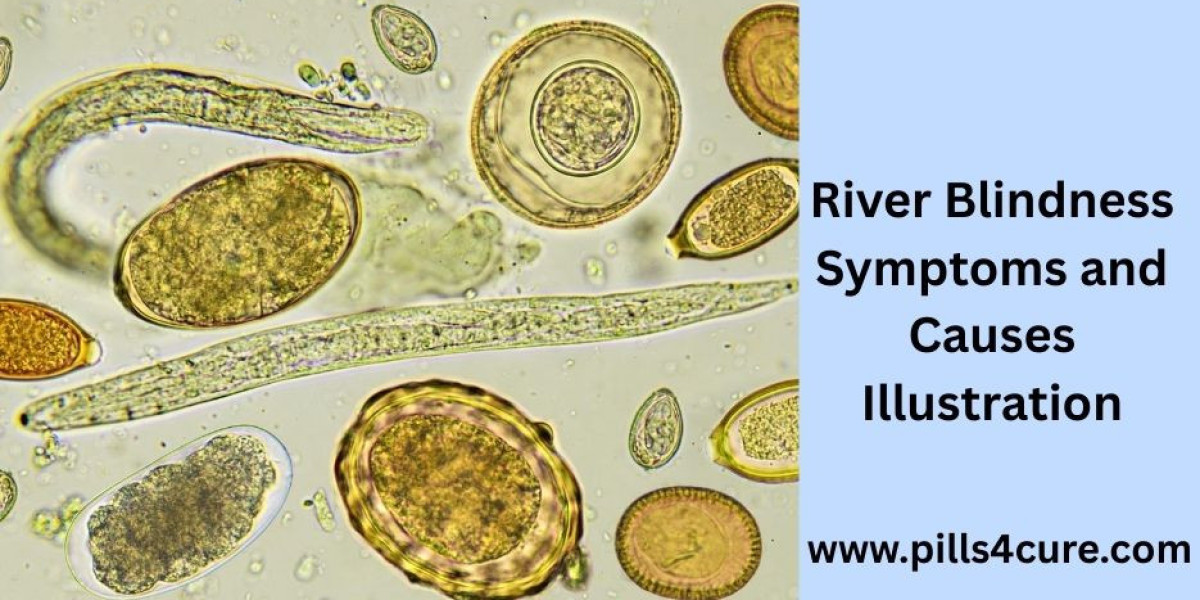River blindness, medically known as onchocerciasis, is a serious tropical disease that continues to affect millions of people living near fast-flowing rivers and streams. This condition can cause severe itching, skin problems, and even permanent vision loss if not properly managed. For UK residents, especially those traveling to or returning from endemic regions, understanding the risks of river blindness is essential. Effective prevention and treatment options are available, with ivermectin 3 mg tablets widely recognized as a primary therapy approved by global health authorities. In this guide, we'll cover what river blindness is, its symptoms, and how timely treatments can help protect against long-term complications, with references to MHRA-approved resources for safe management.
What is River Blindness?
River blindness is a parasitic infection that primarily impacts the skin and eyes, often resulting in severe itching, skin changes, and, in advanced cases, irreversible vision loss. The term "river blindness" stems from its association with rivers, where the transmitting insects breed. For individuals in the UK, this disease is rare domestically but can be a concern for travelers to sub-Saharan Africa, parts of Latin America, and Yemen. Understanding what is river blindness is crucial for early recognition and seeking prompt medical advice from NHS professionals.
Causes of River Blindness
River blindness is caused by repeated bites from infected blackflies of the Simulium species, which thrive in riverside environments. These flies transmit the parasite during blood meals, leading to infection. In the UK context, while the disease isn't endemic, awareness is vital planning for those trips to affected regions. How river blindness is caused involves a cycle where the parasite matures inside the human host, producing microfilariae that migrate through tissues, triggering inflammatory responses.
The River Blindness Parasite
At the heart of the infection is the river blindness parasite, Onchocerca volvulus, a filarial worm that can live for up to 15 years in the human body. Adult worms form nodules under the skin, releasing millions of microfilariae that cause the disease's hallmark symptoms. This parasite's lifecycle relies on blackflies as vectors, making riverine habitats high-risk zones.
Signs and Symptoms of River Blindness
The symptoms of river blindness can vary in severity, often appearing months or years after infection. Initial signs include intense itching and skin rashes, progressing to more noticeable changes like thickened, discolored skin (known as "lizard skin") and subcutaneous nodules. As the infection advances, ocular involvement may lead to blurred vision or blindness. For UK travelers returning from endemic areas, recognizing these symptoms of river blindness early such as persistent pruritus or eye discomfort is essential to consult a GP promptly.
Early Signs to Watch For
Early indicators often manifest as mild skin irritation, which can escalate if ignored. Subtle signs like papular dermatitis or depigmentation should prompt medical evaluation, especially post-travel.
Advanced Symptoms
In later stages, symptoms may include severe visual impairment due to corneal scarring or optic nerve damage, underscoring the importance of timely intervention.
Diagnosis of River Blindness
Diagnosing river blindness typically involves skin snips to detect microfilariae under a microscope, serological tests, or eye examinations. In the UK, specialists at tropical hospital clinics, such as those affiliated with the NHS, use these methods. Advanced imaging or PCR tests may also be employed for confirmation, ensuring accurate identification before proceeding to river blindness treatments.
River Blindness Treatments
Effective river blindness treatments focus on eliminating the microfilariae and managing symptoms. The cornerstone medication is ivermectin, which has dramatically reduced the disease's prevalence globally. In the UK, while ivermectin is MHRA-approved for certain parasitic infections like strongyloidiasis and scabies, its use for onchocerciasis is often on an unlicensed basis under specialist guidance. Always consult a healthcare provider for personalized advice.
Ivermectin Pills: A Key Treatment Option
Ivermectin pills are administered orally, typically in doses like ivermectin 3 mg adjusted by body weight, and repeated annually or semi-annually for 10–15 years to cover the parasite's lifespan. This treatment kills the microfilariae, alleviating symptoms and preventing transmission. Side effects may include mild itching or swelling (Mazzotti reaction), but it's generally well-tolerated. For UK patients, prescriptions are managed through infectious disease experts, ensuring safe use.
Other Treatment Approaches
In some cases, doxycycline may be used to target symbiotic bacteria in the worms, complementing ivermectin. Surgical removal of nodules can also be considered for symptomatic relief. Recovery involves ongoing monitoring to prevent reinfection.
Prevention and Precautions
Preventing river blindness centers on avoiding blackfly bites in endemic areas. Key precautions include wearing long-sleeved clothing, using insect repellents containing DEET, and avoiding outdoor activities during peak fly hours (daytime). For UK travelers, the NHS recommends pre-travel consultations for advice on prophylactic measures. Community-level strategies, like mass drug administration programs, have been successful globally, but personal vigilance remains essential.
Travel Tips for UK Residents
Before heading to high-risk regions, check the Foreign, Commonwealth & Development Office (FCDO) travel advice and consider vaccinations or medications. Upon return, monitor for symptoms and seek NHS care if needed.
Recovery from River Blindness
Recovery from river blindness is possible with consistent treatment, leading to symptom resolution and halted progression. Vision loss, if present, may not reverse, but early intervention preserves sight. Long-term follow-up ensures complete parasite clearance, allowing individuals to resume normal activities.
Frequently Asked Questions (FAQs)
What is the main cause of river blindness?
River blindness is caused by the parasite Onchocerca volvulus, transmitted via blackfly bites.
How effective are river blindness treatments?
Treatments like ivermectin are highly effective in controlling symptoms and reducing transmission when taken as prescribed.
Can river blindness be prevented?
Yes, through bite prevention and, in endemic areas, community drug programs.
Is ivermectin available in the UK for this condition?
Ivermectin is used in the UK for river blindness under specialist supervision, though not licensed specifically for this indication per BNF guidelines.
What should UK travelers do if they suspect infection?
In summary, understanding river blindness from infection to recovery empowers better health decisions, particularly for those in the UK venturing abroad. Stay informed, take precautions, and consult professionals for the best outcomes.










